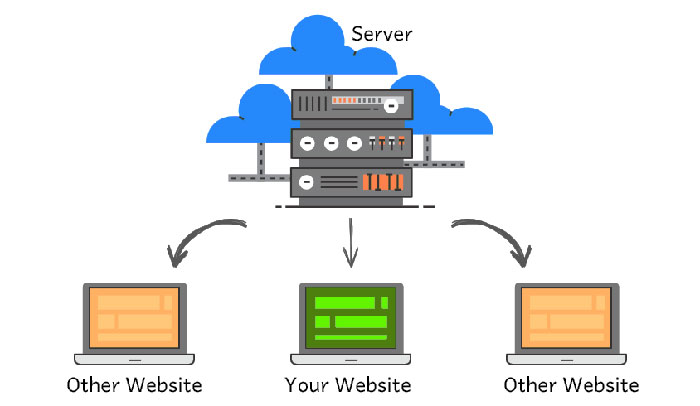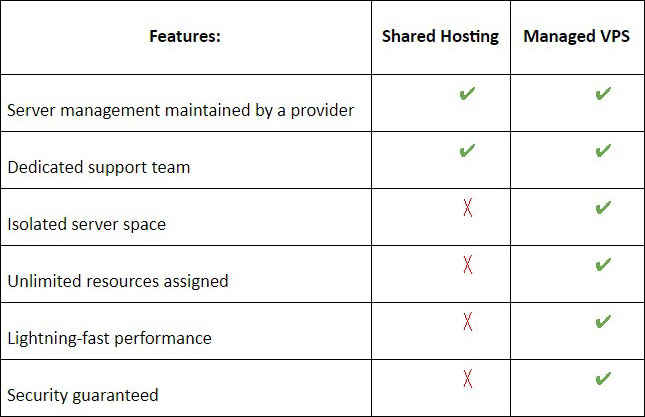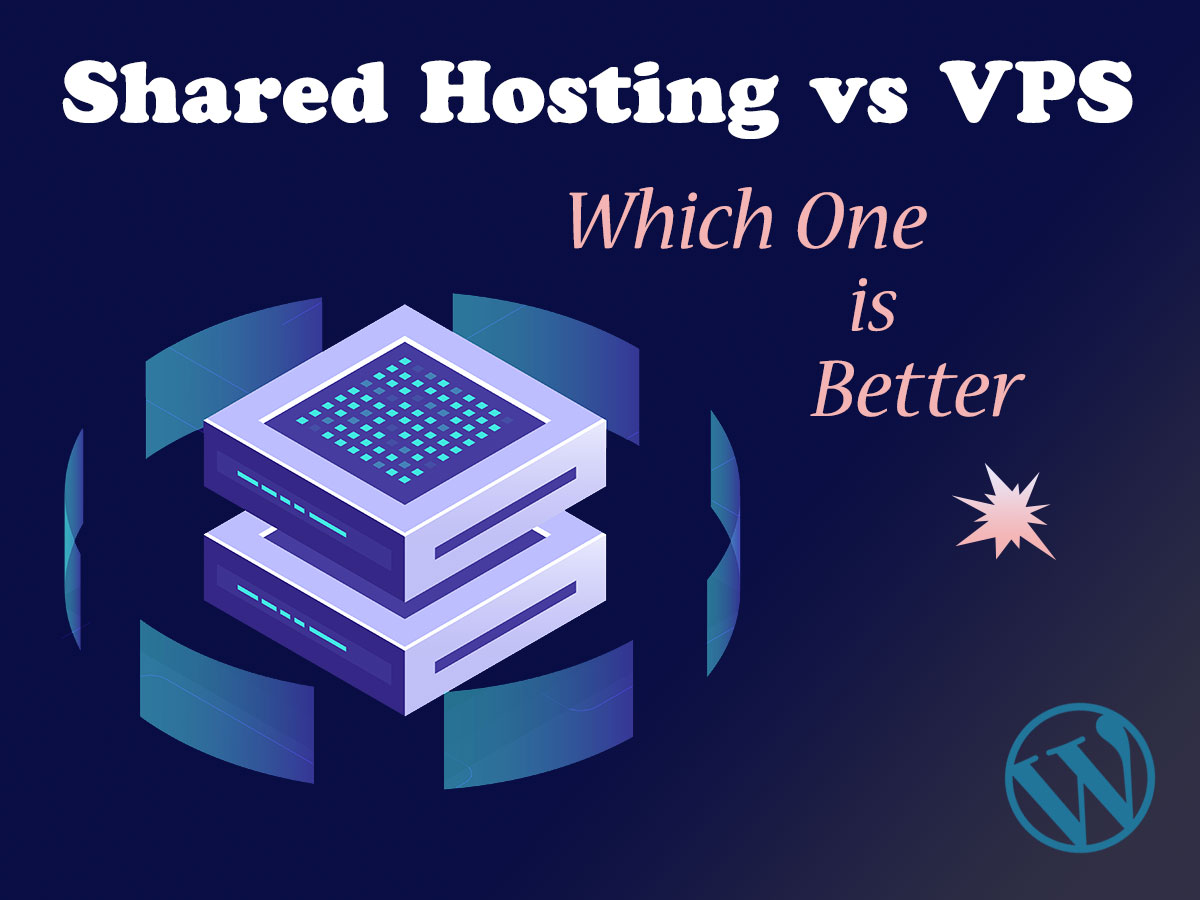If you’re about to launch a personal or business website, then lightning-fast hosting is a must. If a dedicated server is not affordable for you, then you can choose between a shared one and VPS.
In this post, I’d love to define each type of hosting, review its advantages, and decide which one is better to choose for launching your debut website.
Let’s start!
What is shared hosting?
Shared hosting means that you host your website on a physical server together with some other websites also hosted on the same server. In other words, you share the server with other sites within the same space.

Let’s see what you get:
- The provider grants a website owner specific software and apps helpful for managing their websites.
- You get a cost-effective service because many users share the same virtual machine, so they also share the costs for such type of hosting. This is why shared hosting is a cheap and quite affordable variant of a virtual machine.
- Shared servers (as well as any other ones) possess their own hard drive space, CPU (central processing unit), and RAM. These things are called the resources, and they are shared between the users hosted on the same server.
- With a shared virtual server, you can host more than one website without the necessity to purchase two separate hosting plans for each website. Modern providers supply enough disk space that most small businesses and personal blogs require.
Bandwidth, Pros and Cons of Shared Hosting
Bandwidth means the volume of traffic and data your website is able to process. Sometimes the bandwidth of shared hosting is not enough. However, if you choose a reliable provider, then you get the scalable bandwidth which is going to allow you to accommodate as much traffic as you need.
Let’s enumerate the pros of shared hosting:
- Cost-Efficiency. As multiple users share the same server space, all of them contribute to the costs, so the prices for hosting your website are kept low.
- Easy Setup and Support. You can easily and quickly set up your website on a shared virtual machine without any technical skills. Reliable providers are always happy to provide support to their customers that require some help while installation.
- Simple Maintenance. A hosting provider is responsible for server maintenance, so a website owner can focus on developing their sites and growing their business.
- Data Protection. Even though your server space is shared, your information is kept secure and protected, and no one has access to it. Only you can manage and edit your website information without the risk for it to be stolen.

What are the cons of shared hosting?
- Occasional Slow-Downs. As your website shares the CPU power and Ram memory with other websites hosted on the same server, it can be sometimes the reason for your website’s poor performance.
- Potential Security Risks. If you select the shared hosting, you should be aware of the duty to keep your SSL certificate up-to-date, regularly update your plugins, and use additional security solutions to defend your site from possible hacker attacks.
- Limited Customization Possibilities. You don’t have access to the backend of a shared server because this server is owned by many other users and not just you. This means that your possibilities concerning the installation of an alternative operating system or getting the hardware independence are limited.
What is VPS?
VPS is a virtual private server (a virtual machine) provided by a web hosting company. Modern providers mostly offer the SSD-powered VPS or VPS cloud hosting types.

What you get:
- VPS can be either SSD (solid-state drive) or HDD (hard disk drive) based one.
- SSD one is a physical disk on a physical server and it is much better than HDD because data is stored on the flash-memory chips connected to each other. These chips retain the data even when there’s no power available.
- VPS cloud hosting, in its turn, means that your server is set up over a cloud. All data is stored on a virtual server instead of a physical one.
- A single physical machine can host multiple virtual private servers (VPSs) while cloud-based VPS may be hosted across multiple servers.
- A web host is the most common type of VPS. It is a kind of alternative to shared and dedicated hosting variants because it is neither a shared nor a dedicated one by its nature. VPS is quite affordable by price and quite good when it comes to performance.
- As well as a shared server, VPS can share some physical machine resources with other hosting accounts. However, as VPS is called a private one, it is isolated from other accounts, so you can configure it as per your custom needs.
Managed and Unmanaged VPS
What’s the difference between managed and unmanaged VPS hosting? Well, as the names suggest, their definitions are obvious.
If you select managed VPS, then you don’t need to worry about your server management. The provider completely maintains your server and it is fully responsible for updating the core, making automatic backups, installing software as well as ensuring your website security.

If you prefer unmanaged VPS hosting you have to take care of all the server responsibilities and maintenance tasks. Your hosting provider just takes care of the server itself and its availability.
Why choose VPS?
Let’s see the advantages of VPS hosting for any commercial, personal, or non-profit web-pages.
With a private virtual machine you obtain:
- Full Root Access. Within an isolated space you are free to set up your server as you want it to.
- Instant Resource Supply. Once the server is set up, you instantly get OS, RAM, and CPU resources.
- Perfect Performance. If you prefer SSD hard drive or cloud VPS, you get the unrivaled capacity that results in high site load speed.
- Website Security. Due to the isolation, your server has a unique IP address, so you are protected from being compromised.
- Dedicated Support. VPS hosting is usually backed by a professional support team providing extended technical support 24/7.
See the comparison table below:

Conclusion:
A great disadvantage of a managed VPS is that it is much more expensive than the unmanaged virtual server or shared hosting. However, as your website’s backend is fully maintained by a provider, there’s no need to hire a technical administrator and pay them a salary. As a result, you save your spendings.
If you prefer the unmanaged VPS, you will have to be responsible for all server maintenance including the security, by yourself, and this is a pretty tough task if you haven’t got the specific technical experience.
If you need an isolated server to modify it based on your unique expectations, then fully managed hosting solutions have you covered. From the other side, if you need hosting for a small project or you are a beginner with a reduced budget and want to save your costs, then you can start from a shared hosting or an unmanaged VPS.
Anyway, it’s up to you.
And I hope this small comparison post was helpful for you.
Melany H.





